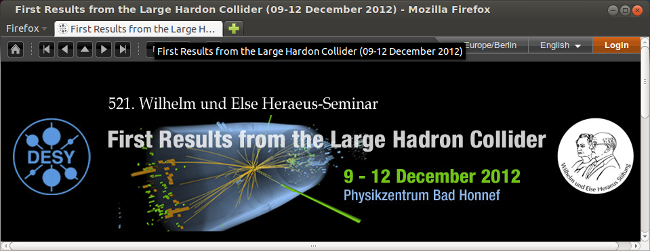The New York Times is reporting that tomorrow Yuri Milner will be announcing the award of a new set of prizes for fundamental physics work, this time including some experimentalists as recipients. The awards are
- $3 million for the experimental discovery of the Higgs at CERN. This will be split into three parts: $1 million to Lynn Evans for his work building the machines, $1 million to ATLAS current and ex-spokepersons Fabiola Gianotti and Peter Jenni, and $1 million to CMS current and ex-spokepersons Joe Incandela, Michel Della Negra and Tejinder Virdee. I’m suspicious that the NYT has missed CMS ex-spokesperson Guido Tonelli, who was on the list I heard about earlier today from a source at CERN.
- $3 million to Stephen Hawking for his work on black holes.
- Three “New Horizons” prizes of $100,000 each to younger theorists working on string theory and SUSY: Niklas Beisert, Davide Gaiotto and Zohar Komargodski.
- Two “Physics Frontiers” prizes of $300,000 each to string theorists Alexander Polyakov and Joe Polchinski, with a third $300,000 prize going to a group of condensed matter physicists (Charles Kane, Laurens Molenkamp and Shoucheng Zhang) who work on “topological insulators” among other subjects.
Polyakov, Polchinski and the group of condensed matter physicists are now the contenders for the $3 million 2013 Fundamental Physics Prize which the NYT story says will be awarded “by a vote of the judges on the morning of March 20 at CERN and announced in a ceremony that evening.”
The special award to the LHC physicists should help make up for the problem that no Nobel prize may end up going to the Higgs discovery because too many people were involved. Milner has the advantage of not being bound by long tradition and arguably out of date rules the way the Nobel Committee is.
On the theory side though, these awards make it clear that the Fundamental Physics Prize story is likely to be heavily dominated by awards from string theorists to string theorists for work on string theory. Besides Hawking, all the recipients have some connection to string theory, with the condensed matter physicists working on a hot topic which many string theorists see as the future of their subject. For more about the recent history of the string theory/condensed matter connection, see this article from last year in Nature which includes this, which refers to certain books published in 2006:
“It’s hard to say whether the interest in condensed-matter applications is a direct response to those books because that’s really a psychological question,” says Joseph Polchinski, a string theorist at the Kavli Institute for Theoretical Physics in Santa Barbara. “But certainly string theorists started to long for some connection to reality.”
Update: The NYT article has been revised to include Tonelli.
Update: The press release with more details is here. There’s a story at the Guardian here. CERN has more here, including interviews with the LHC winners. They comment on the fact that they are getting awards that belong to much larger groups, with Incandela and Gianotti saying they are trying to find a way to distribute the money to younger members of the collaboration who most need it. Lyn Evans comments
I will not be driving around CERN in a Ferrari. That would be very bad for my image.
The Guardian has Hawking saying his plans for the money include helping his daughter who has an autistic son, and maybe a new vacation home.
About the question of what the previous Milner prize recipients are doing with their $3 million, I’ve heard rumors that the one mathematician, Kontsevich, has been giving it away to others. From the physics side, the only thing I’ve seen was that Witten planned to give some to J Street, a group working for peace in the Middle East.
Update: For commentary on whether ATLAS and CMS spokespersons should keep the money, see Tommaso Dorigo.



